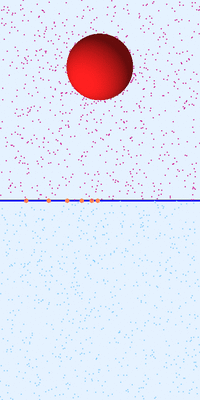Physics:Darwin drift

Note that fluid parcels may also move upward during the passage of the body.
A larger version of this animation can be found here (15 MB), showing e.g. streamlines.
In fluid dynamics, Darwin drift refers to the phenomenon that a fluid parcel is permanently displaced after the passage of a body through a fluid – the fluid being at rest far away from the body.
Consider a plane of fluid parcels perpendicular to the direction of the body's constant velocity vector, far before the passage of the body. During the passage of the body the fluid parcels move, according to their Lagrangian motion. Far after the passage of the body, the fluid parcels are permanently displaced. The volume between the initial plane of the fluid parcels and the surface consisting of the parcel positions long after the body's passage is called the Darwin drift volume.
The phenomenon is named after Sir Charles Galton Darwin, who proved in 1953 that the drift volume multiplied with the fluid density equals the added mass of the body,[1] – known as Darwin's theorem.[2][3]
As shown by Eames and McIntyre in 1999, Darwin drift (by the passage of a body through a fluid otherwise at rest) and Stokes drift (in the fluid motion associated with surface waves) are closely related.[4]
Notes

References
- Benjamin, T. Brooke (1986). "Note on added mass and drift". Journal of Fluid Mechanics 169: 251–256. doi:10.1017/S0022112086000617. Bibcode: 1986JFM...169..251B.
- Camassa, R.; McLaughlin, R.M.; Moore, M.N.J.; Vaidya, A. (2008). "Brachistochrones in potential flow and the connection to Darwin's theorem". Physics Letters A 372 (45): 6742–6749. doi:10.1016/j.physleta.2008.06.093. Bibcode: 2008PhLA..372.6742C.
- Dabiri, J.O. (2005). "On the estimation of swimming and flying forces from wake measurements". Journal of Experimental Biology 208 (18): 3519–3532. doi:10.1242/jeb.01813. PMID 16155224.
- Darwin, Charles (1953). "Note on hydrodynamics". Mathematical Proceedings of the Cambridge Philosophical Society 49 (2): 342–354. doi:10.1017/S0305004100028449. Bibcode: 1953PCPS...49..342D.
- Eames, I.; McIntyre, M.E. (1999). "On the connection between Stokes drift and Darwin drift". Mathematical Proceedings of the Cambridge Philosophical Society 126 (1): 171–174. doi:10.1017/S0305004198003223. Bibcode: 1999MPCPS.126..171E.
- Eames, I.; Belcher, S.E.; Hunt, J.C.R. (1994). "Drift, partial drift and Darwin's proposition". Journal of Fluid Mechanics 275: 201–223. doi:10.1017/S0022112094002338. Bibcode: 1994JFM...275..201E. http://discovery.ucl.ac.uk/1330436/1/download.pdf.
- Falkovich, G. (2011). Fluid Mechanics (A short course for physicists). Cambridge University Press. ISBN 978-1-107-00575-4.
- Yih, Chia-Shun (1985). "New derivations of Darwin's theorem". Journal of Fluid Mechanics 152: 163–172. doi:10.1017/S0022112085000623. Bibcode: 1985JFM...152..163Y.
- Yih, Chia-Shun (1997). "Evolution of Darwinian drift". Journal of Fluid Mechanics 347 (1): 1–11. doi:10.1017/S002211209700654X. Bibcode: 1997JFM...347....1Y.
 |

